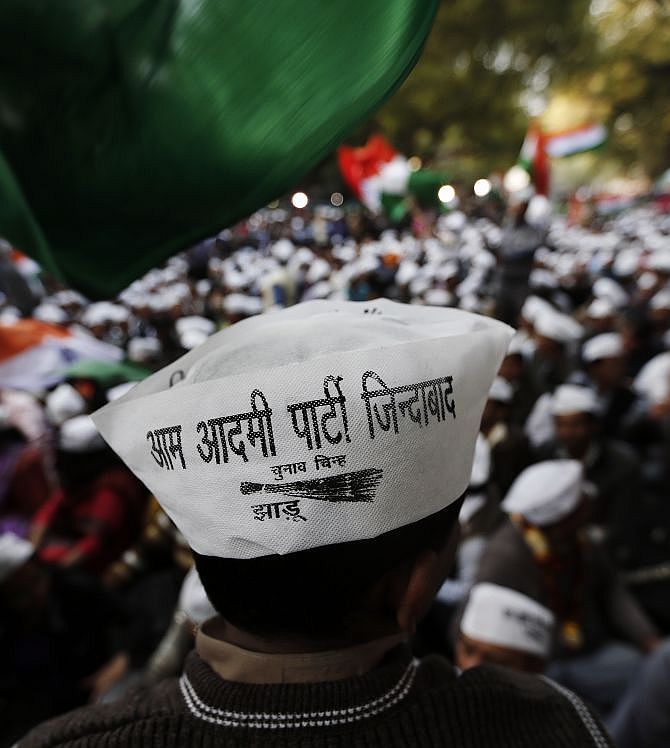 Arvind Kejriwal's most awaited Lokpal bill may remain just a poll promise. The proposed Lokpal cannot exercise any police power, says advocate Vishwanath Chaturvedi.
Arvind Kejriwal's most awaited Lokpal bill may remain just a poll promise. The proposed Lokpal cannot exercise any police power, says advocate Vishwanath Chaturvedi.
The territory of Delhi is constitutionally identified as the 'National Capital Territory of Delhi'. The NCT is not a 'state,' but is a 'Union Territory' with an elected legislature.
This elected legislature has the same powers as any other 'state legislature' in our country except the power to make laws concerning three critical subjects -- police, public order and land.
So, in respect of these three subjects, only Parliament and the central government are competent to make any law for Delhi. A few other countries also have similar constitutional arrangements for their national capitals and the original intention behind such constitutional arrangement appears to be a desire to prevent the local government from waging an armed rebellion against the central government in the national capital.
So, the Delhi local police and all police stations in Delhi are under the exclusive control and supervision of the central government.
The Delhi legislature cannot create any police agency or clothe any existing agency with 'police powers' through the proposed 'Lokpal Bill'.
So, in terms of the Constitution of India, the Delhi legislature may create a Lokpal and confer very limited powers upon it, such as the 'power to enquire'.
For instance, the power to summon any person, the power to order the production of any document and the power to examine a person on oath are considered to be 'soft' powers to the point that Constitutionally, these powers are not considered to be 'police powers' and therefore, the Delhi legislature could freely create any authority and vest in such authority, such 'soft powers'.
In fact, the Delhi Lokayukta and Uplokayukta Act, 1995 already does that.
On the other hand the strict 'police powers' are the power to arrest an accused, power to seize any property involved in a crime, power to search any place suspected to harbour an offender, power to summon and examine any witness to a crime, power to compulsorily subject an accused to a forensic examination, power to bear arms in discharge of some duties, power to force assistance or cooperation from strangers during investigation and the power to seal premises involved in a crime.
None of these 'police powers' can be exercised by any agency or authority created by the Delhi legislature. Therefore, although the Delhi legislature may create a Lokpal, it cannot Constitutionally confer upon such a body, the power to criminally investigate any person.
Any such power to criminally investigate any offender under the proposed Delhi Lokpal Bill may only be conducted by an existing police agency supervised by the central government. Therefore, this inability to criminally investigate an offender would be the basic constitutional limitation of any ‘Lokpal’ created by the Delhi legislature.
Only a few days ago, I was constrained to file a petition in the Supreme Court asking that the central government's review petition against Section 377 (which criminalises homosexuality) be dismissed forthwith.
The central government has a Constitutional duty to defend a parliamentary statute in the courts and it is always placed as a compulsory respondent in court proceedings where any party challenges a provision in a parliamentary statute.
However, if the central government does not wish to defend a parliamentary statute in any such court, it may very well choose to remain silent.
Instead, if the central government itself petitions the court and ask that a provision in a parliamentary statute be struck down by the court, as has just happened here, it would have ended up suing itself -- the central government acting as both the petitioner and the respondent in the same petition.
This would be a legal absurdity and that is why, I have asked the Supreme Court to dismiss the central government's review petition as that petition amounts to the central government suing itself.
Supreme Court advocate K V Dhananjay has deliberated on the legal aspects stated above. Only in our country can politicians promise that which is legally not possible for them to deliver. Arvind Kejriwal is no exception.
Vishwanath Chaturvedi is an advocate in the Supreme Court and the petitioner in the disproportionate assets case against Samajwadi Party chief Mulayam Singh Yadav.










